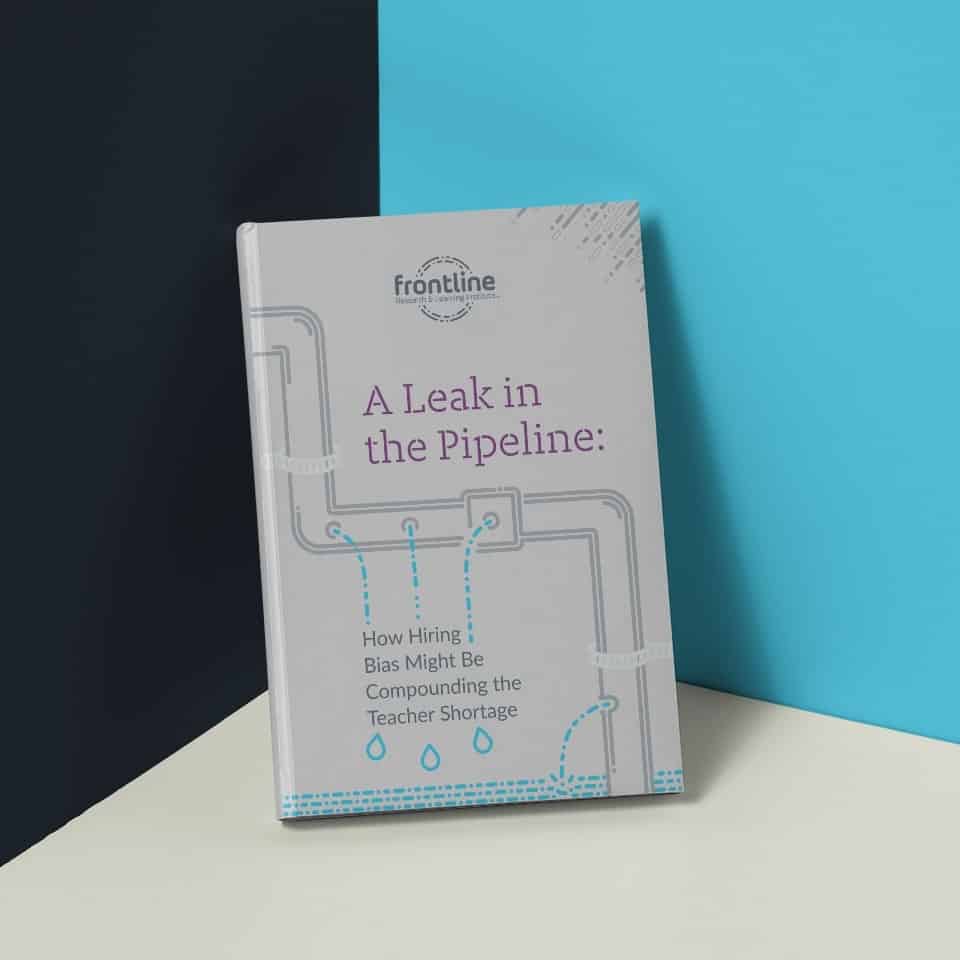Report identifies trends in school district hiring practices that may have unintended consequences for teacher turnover.
MALVERN, PENNSYLVANIA – January 11, 2018 – The Frontline Research & Learning Institute today released A Leak in the Pipeline: How Hiring Bias Might Be Compounding the Teacher Shortage. The research report aims to increase understanding of where teacher recruiting and hiring practices may be falling short. The analysis suggests that certain biases in the hiring process may contribute to the nation’s $2.2 billion annual teacher turnover problem – often cited by states and districts as a contributor to teacher shortages.
According to the analysis, educators who are applying for positions are often coming from a broad range of sources, including public job boards and interstate websites–yet those who are hired are coming disproportionately from known sources such as local referrals and district websites. While responses to job board postings consistently generated about 40% of active-license candidate applications, school districts selected only about 12% of the applicants from those pipelines. By contrast, while about 15% of applications came from referrals, over 30% of educators were hired from those sources.
A Leak in the Pipeline draws on de-identified hiring and referral data from 832 public school districts in 45 states and more than 250,000 unique applicants from July 2014 to June 2017. The dataset reflects persistent trends across a broad range of school districts. In a time when it is increasingly essential for school districts to adopt more effective strategies for recruiting and hiring teachers, these data can help school leaders examine and adjust their practices to maximize teacher fit, minimize turnover, and improve student outcomes.
“We noticed that hiring practices that seem to be consistent across hundreds of districts might actually be constricting a pipeline of qualified candidates by reducing attention to candidates who come from outside sources, and instead over-emphasizing local referrals,” said Elizabeth Combs, managing director, Frontline Research & Learning Institute and co-author of the report. “This may reflect the presence of likeability bias, a well-documented trend toward choosing people you know, or favoring those who are like you over those who may be better qualified.”
But familiarity does not guarantee a new hire will be a better fit than a candidate from another source. “We found that a bias for local candidates may be causing districts to miss out on promising candidates,” said Sarah Silverman, Ph.D., senior vice president at Whiteboard Advisors and co-author of the report. “Districts might actually be reducing the diversity of their candidate pool by selecting few individuals from broad, public sources.”
The report suggests school districts could enhance their recruiting and hiring practices by casting a wider net, and then employing a more standardized, rigorous screening and interview process that raises the likelihood that highly qualified, or good fit candidates will be hired even if they do not have an existing personal connection to the school district.
“Districts could benefit from standardizing review systems and using performance-based screening processes, rather than relying too heavily on word of mouth or a local connection.” said,” said Combs. “A different approach to recruiting and hiring can help school leaders choose candidates who will be a better fit, stay longer, and lead to more stability and better outcomes for students.”
The report is available for download here.
About the Frontline Research & Learning Institute:
The Frontline Research & Learning Institute is a division of Frontline Education, an integrated insights partner to K-12 school districts nationwide. The Institute is a learning organization dedicated to providing data-driven research, resources and observations to support and advance the educational community. Driven by the vast amount of records across Frontline’s comprehensive solutions portfolio, the Institute leverages data from more than 12,500 K-12 organizations and several million users to reach findings and provide benchmarks that inform strategic decision-making for the education community. The Frontline Research & Learning Institute works with Johns Hopkins Center for Research and Reform in Education to ensure all research reports and analyses are rigorously-validated and representative of national data.
